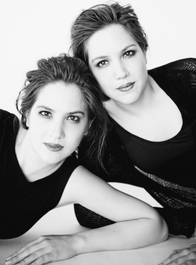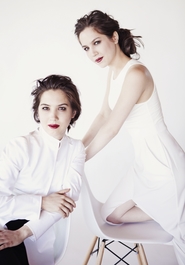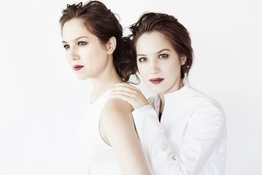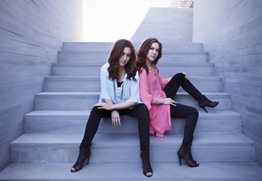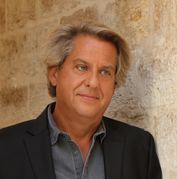

Christina and Michelle Naughton
News
"There is no me and you when we play together," say identical twin pianists
"There is no me and you when we play together...we're talking as one, often," explain Christina and Michelle Naughton of the unique chemistry and intimacy they share in music.
In this making-of video for their new album Visions, the sisters often play with their eyes closed, attuned to every nuance that passes between them.
"It's a really beautiful thing for us. We've shared everything since a very young age and we love that.
"When we think of one word that describes this album, it's 'joy'. There's so much joy in each of these pieces."
Christina and Michelle Naughton's Visions - Bach, Messiaen, John Adams - is out now.
A Q&A with twin pianists Christina and Michelle Naughton
How did you end up as musicians when your parents are both mathematicians?
Michelle: Actually, one of our favorite subjects growing up was math. I think our love of math made contemporary music more enjoyable to us. In high school, each of us played several of Ligeti’s solo piano etudes, which incorporate many mathematical patterns and sequences. Since then, we have found mathematical influences in much of the 20th and 21st century music we perform, including the John Adams work on the new album, Visions.
Christina: Our parents were always very supportive. They drove us some very long distances to our lessons. Some of our happiest childhood memories are the long road trips our family took for our musical training.
M: To me, the whole thing seemed very natural. I was surprised to find out that not every other child was doing the same things. I remember in nursery school, the teacher would play a clean-up song at the end of the day. Once I wandered over to the piano and worked out the song myself. And everybody was like, “How did you do that?” That was the first time I realised that not every kid plays the piano!
C: We don’t remember it ourselves, but we’ve been told we started learning to play on the same day, separately actually, when our mother decided to start each of us on our musical journey.
Is there anything like a musical rivalry between the two of you?
Michelle: Somehow the nature of music never lent itself to competition. We always have been and still are the biggest source of support for each other in our musical lives.
Christina: We definitely better each other as musicians. Even as kids, when one of us would struggle with a particular musical concept, the other would be right there to help out. Of course, that didn’t make us immune (away from the piano) to the occasional “She got the bigger piece of cake”, or “I wanted the blue dress!”
Does either of you have a preference for playing piano four hands as opposed to two pianos?
Christina: It really just depends what mood I’m in.
Michelle: Playing two pianos can feel like having a whole orchestra at your fingertips.
C: But four hands can be great for more intimate settings. There are times when the music calls for all four hands to “speak” with the same voice. These moments are especially moving when we are sharing the instrument. But more monumental music needs two pianos. Even just visually, the way two pianos occupy the stage makes a statement.
What’s your rehearsal process? Is it all about intuition, or is there a lot of discussion and planning?
Michelle: For us, the exploration and preparation of each note is just as enjoyable as the performance. Our intuition of each other has deepened over the years because of intense rehearsal. Even as twins, it is certainly something that doesn’t 100% come naturally.
Christina:I think because of the intuition we have developed, we no longer have to verbalise a lot of our rehearsing, almost as if we have a secret language. Onstage, we are able to spontaneously communicate and feel free. Sometimes, I almost feel more in tune with what she is doing than of myself.
Do you think that connection comes from being identical twins? Or is it about growing up together?
Michelle: Certainly both of those things play into our communication both musically and otherwise, though sometimes it is hard to put our finger on exactly how. In our case I definitely think our shared experiences growing up led to us developing our own "language"! There are many instances both onstage and off where a simple glance at one another will convey more than what would normally be expressed in multiple sentences in typical one on one interactions!
Christina: It's interesting to sometimes think about whether or not this aspect of our twinship is even unique to twins in general, as I know that some twins who have grown up separately have ended up even more similar than twins who grew up together, simply because they weren't under any pressure to be different! But regardless of any of this, all I really know is that our relationship is based on the joy of experiencing and learning things together, and that's what we feel is intrinsic to the musical dialogue that comes forth in our performances.
Why do you suppose you often both play with your eyes closed?
Michelle: Performing can be an all-encompassing process, so I think that’s where it comes from.
Christina: Of course, it’s also possible we’re just jet-lagged!
M: But really, when you play music, you feel consumed. It can be like being in a different world.
C: I also think maybe, when I’m performing, it can be so intense I feel like I need to shut off my other senses to some degree.
What ties the pieces in the program together?
Christina: All of these pieces express joy, and each in a very different way. Of course the joy in the Messiaen stems from his deep faith. He wrote this piece after his time in a prison camp, and the fact that he was able to write something with so much color and hope after such a dark time makes it all the more uplifting. The Adams work is an extraordinary expression of "in the moment" joy, written in a fresh and modern idiom. It is a masterpiece!
Michelle: It’s so exuberant. As for the Bach, the joy he brings in this short piece is not so much a happy go lucky joy, but a joy that stems from a deep sense of peace. He wrote it for funeral service, some say for his relative, so you would think it would be depressing. But instead, Bach titles the piece God's time is the best time, and Bach's strong belief in this comes through in the music.
Isn’t the program overall pretty esoteric given how young you are?
Christina: For us, this music is the opposite of esoteric. I loved Bach as a very small child. We have performed the Messiaen for audiences including children and their excitement reveals that it awakens something inside them.
Michelle: Music is really a journey into the human soul. It speaks to all, young and old. As performers, our mission is to delve into the depths of the composer’s soul and attempt to touch the souls of our present day audience with the hopes of mysteriously uniting us all. Music reveals all that makes us human.
Christina and Michelle Naughton's album Visions - Messiaen, Bach, and Adams - will be released on 26 February.
Warner Classics signs twin piano sensations Christina and Michelle Naughton
Warner Classics is delighted to announce the exclusive signing of the piano duo Christina and Michelle Naughton. Based in New York, the 27-year-old identical twins have played together from an early age, both graduating from the Curtis Institute and The Juilliard School.
Though hailed the natural successors to the Labèque sisters, the Naughtons have a unique bond – onstage and off – imbuing their playing with an extraordinary synergy and intensity. The Philadelphia Inquirer characterizes their performances as “paired to perfection”, while the San Francisco Examiner has praised their “stellar musicianship, technical mastery, and awe-inspiring artistry”.
The Naughtons’ debut Warner Classics recording, entitled Visions, is slated for release on February 26, 2016. "We are so excited to have the opportunity to develop and share our ‘vision’ of a unique set of repertoire that has brought us so much joy,” said Christina and Michelle of the signing. “We are especially grateful to do so in collaboration with Warner Classics—the force behind innumerable beautiful recordings that continue to inspire the musical world. It is a privilege to be a part of the Warner family."
The album’s wide-ranging program for piano four hands and two pianos brings together three very different composers – Bach, Messiaen and John Adams – united, say the sisters, by profound spiritual joy expressed in music and rhythm.
Moving from what Christina describes as the “fresh modern idiom” of the interlocking piano parts in Adams’ Hallelujah Junction to the serenity and “deep sense of peace” Michelle finds in Bach’s Sonatina from the Cantata BWV 106, the album concludes with Messiaen’s ecstatic, mystical masterpiece, Visions de l’Amen.
Above all, the album reflects the Naughton sisters’ sheer joy in making music together. “We always have been and still are the biggest source of support for each other in our musical lives,” says Michelle.
Michelle and Christina are Steinway Artists and have performed together with ensembles including the Philadelphia Orchestra, Mahler Chamber Orchestra, Houston Symphony, Hong Kong Philharmonic, Royal Flemish Philharmonic and the Solistes Européens Luxembourg, with major recital appearances at France’s La Roque d’Antheron, the Bremen Music Festival, Naumburg Orchestral Concerts in New York’s Central Park and Prague’s Strings of Autumn Festival.
Michelle and Christina Naughton’s Warner Classics debut, Visions, will be released February 26, 2016.
